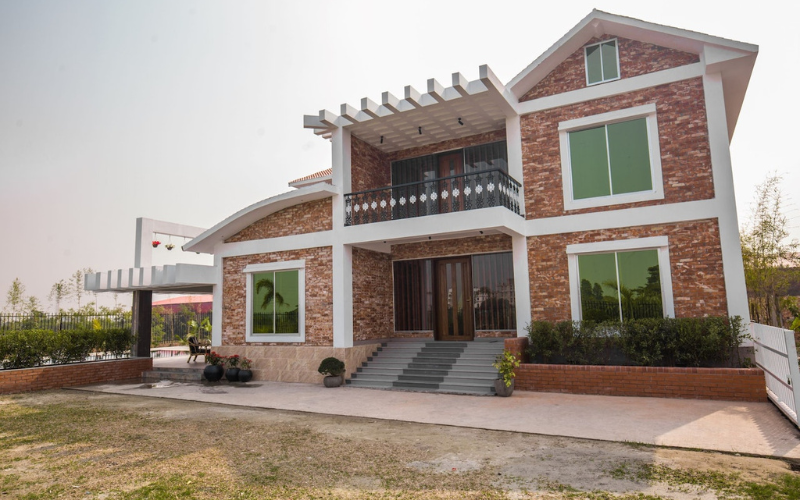5 Mistakes to Avoid When Investing in Nigeria’s Luxury Real Estate Market

Investing in luxury real estate presents unparalleled opportunities for financial growth and diversification, particularly in vibrant markets like Nigeria. However, to capitalize on these opportunities effectively, investors must navigate the complexity of Nigeria’s real estate investment with precision and foresight.
In this article, we’ll delve into the quintessential mistakes that investors should steer clear of when venturing into Nigeria’s luxury real estate market.
From overlooking crucial steps like property inspection and evaluation to neglecting legal and regulatory considerations, each mistake carries the potential to jeopardize investments and impede long-term success.
By understanding and avoiding these pitfalls, investors can position themselves strategically to thrive in Nigeria’s dynamic luxury real estate sector.
1. Overlooking Comprehensive Research and Due Diligence

Photo: Freepik
Investing in luxury real estate in Nigeria can be lucrative, but it’s crucial to avoid common pitfalls that could derail your investment. One such mistake is failing to conduct thorough research and due diligence. Without a deep understanding of market dynamics, property values, and investment risks, investors may expose themselves to costly errors and unforeseen challenges.
Before committing to real estate investments, it’s imperative to conduct comprehensive market research.
This step involves analyzing current trends, demand-supply dynamics, and emerging opportunities in the Nigerian real estate market. By examining Nigeria’s luxury real estate market data, economic indicators, and demographic trends, investors can pinpoint high-growth areas and identify properties with strong investment potential.
In addition to market research, investors should perform due diligence on individual properties and locations. This includes evaluating factors such as property condition, neighbourhood amenities, and proximity to transportation, schools, and commercial centres. Moreover, assessing potential risks such as environmental hazards or legal encumbrances is crucial.
Thorough due diligence mitigates risks and ensures that investors make informed investment decisions aligned with their financial goals and risk tolerance. It is noteworthy that by just research and due diligence, investors can navigate the complexities of Nigeria’s luxury real estate market with confidence and maximize their investment returns.
2. Neglecting Property Inspection and Evaluation

Photo: Freepik
Another critical mistake to avoid when investing in Nigeria’s luxury real estate market overlooking the importance of property inspection and evaluation. Neglecting inspection and evaluation of the property can lead to costly errors and unforeseen challenges.
Property inspection is a fundamental aspect of the due diligence process because it allows investors to thoroughly assess the physical condition, structural integrity, and potential risks associated with a property before committing to a purchase. By conducting a comprehensive inspection, investors can uncover any underlying issues, defects, or maintenance concerns that may impact the property’s value or suitability.
From structural flaws to plumbing, electrical, or roofing issues, a thorough inspection provides valuable insights into the overall condition of the property. Moreover, evaluating the property’s value and potential for appreciation based on market trends, comparable sales data, and future development prospects is critical.
Understanding the factors driving property values and growth potential in the Nigerian luxury real estate market empowers investors to assess the long-term viability and profitability of their investment.
3. Giving in to Emotional Decision-Making

Photo: CFA Institute
Emotional decision-making poses a significant risk for investors in Nigeria’s luxury real estate market as it can cloud judgment and lead to impulsive or irrational investment choices.
Successful real estate investment demands a disciplined, rational approach grounded in careful analysis, objective evaluation, and strategic planning.
Therefore, investors must resist the urge to make impulsive buying decisions driven by emotions or external pressures. This is important because hastily entering into a real estate investment without conducting proper due diligence or considering market conditions can result in costly mistakes and regrets.
To avoid this pitfall, it is advisable that investors should take the time to thoroughly assess investment opportunities. This involves weighing the pros and cons, consulting with trusted advisors, and considering Nigeria’s luxury real estate market conditions before making any decisions.
A rational investment approach involves conducting comprehensive research, analyzing relevant data and market trends, and objectively assessing the potential risks and rewards of each opportunity. Without a doubt, by adopting such a disciplined strategy, investors can enhance their chances of success and achieve their long-term wealth-building goals in Nigeria’s real estate market.
4. Failure to Prioritize Property Management and Maintenance

Photo: Freepik
Neglecting property management and maintenance poses a significant risk to real estate investments in Nigeria’s luxury market. Without any doubt, effective property management is crucial for maximizing rental income, preserving asset value, and ensuring tenant satisfaction.
Similarly, proactive maintenance helps prevent costly repairs, prolongs the lifespan of property assets, and enhances the overall appeal of investment properties.
Investors should prioritize effective property management to address tenant needs, enforce lease agreements, and maintain optimal occupancy levels. Property managers in Nigeria’s luxury real estate play a crucial role in marketing properties, screening tenants, collecting rent, handling maintenance requests, and resolving disputes.
By delegating property management responsibilities to qualified professionals or management firms, investors can streamline operations, mitigate risks, and optimize returns on their real estate investments.
Budgeting for ongoing maintenance and repairs is another critical aspect of prudent property ownership. Furthermore, investors should also allocate funds for routine maintenance tasks such as landscaping, pest control, and HVAC servicing, as well as unforeseen repairs or capital improvements.
5. Disregarding Legal and Regulatory Considerations

Photo: Strategic Thinking Institute
Ignoring legal and regulatory considerations is a perilous mistake that investors in Nigeria’s luxury real estate market must avoid. This is so important because the legal framework surrounding Nigeria’s luxury real estate transactions is intricate and extensive, comprising numerous laws, regulations, and compliance requirements.
Investors who aim to gain from luxury real estate should acquaint themselves with Nigerian real estate laws to sidestep legal pitfalls and prevent costly disputes.
Key legislation such as the Land Use Act, Tenancy Laws, and Environmental Regulations govern various facets of real estate transactions, property ownership, and land use rights because understanding these laws’ provisions is imperative for safeguarding investors’ interests and ensuring adherence to legal standards.
Also, compliance with legal requirements is paramount in luxury real estate investment as investors must ensure that their transactions comply with applicable laws, obtain requisite permits and approvals, and fulfil contractual obligations to avert legal entanglements and potential liabilities.
Engaging legal professionals well-versed in Nigerian luxury real estate law can offer invaluable guidance and assistance in navigating legal complexities, thereby shielding investors’ interests and mitigating risks.























[…] 5 Mistakes to Avoid When Investing in Nigeria's Luxury Real Estate Market […]